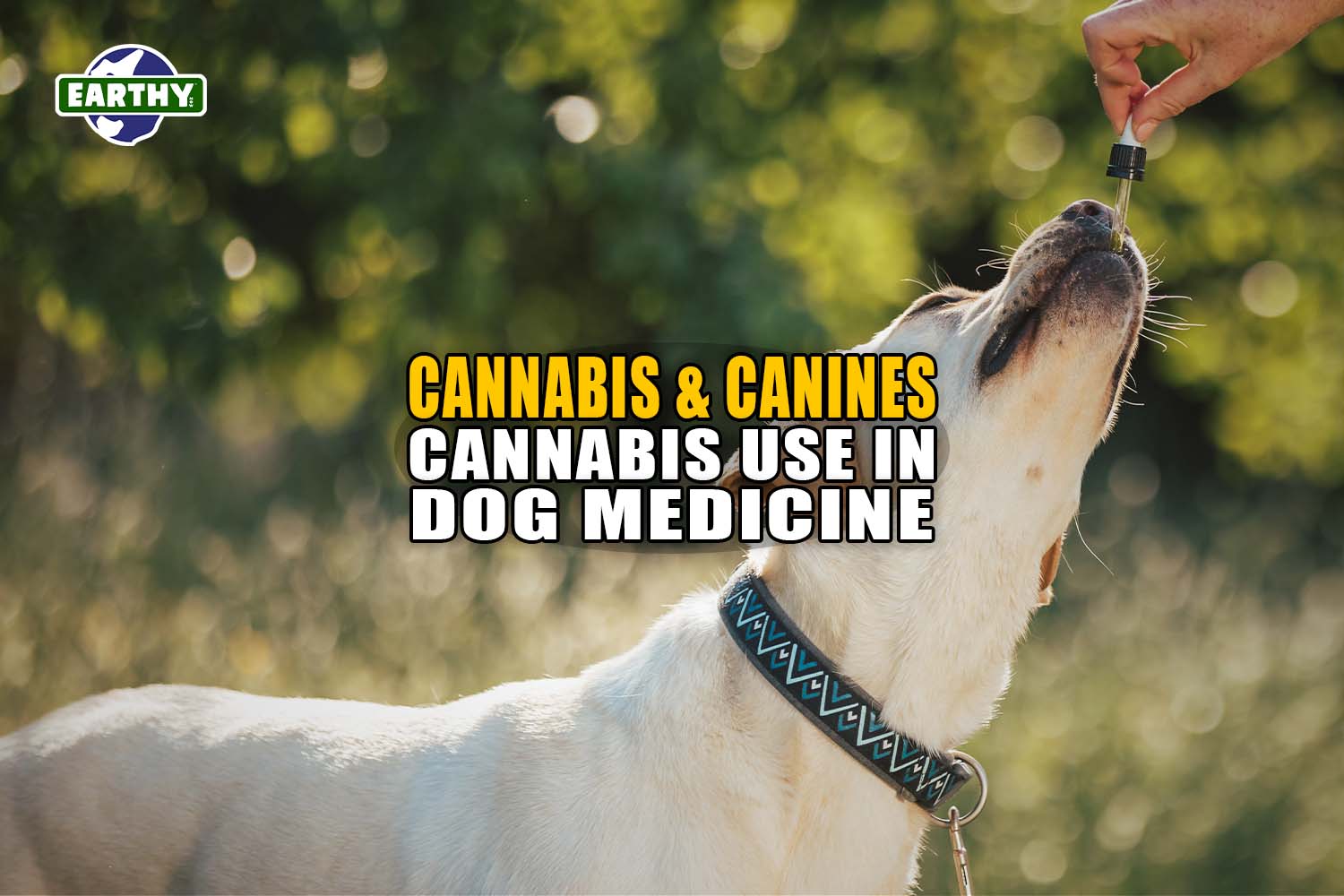In recent years, the use of cannabis in veterinary medicine has sparked both interest and debate among dog owners and veterinarians alike. As the legalization of cannabis for medical and recreational purposes spreads across various regions, more people consider its potential wellness benefits for their pets. Here, we’ll explore the science behind cannabis use in dog medicine, examining the benefits, risks, and current research on this controversial topic.
The science of cannabinoids
Cannabis, derived from the plant Cannabis sativa, contains a variety of active compounds known as cannabinoids. For example, the most well-known of these are tetrahydrocannabinol (THC) and cannabidiol (CBD) [1]. However, pet owners should never give THC to their pets because it is the psychoactive ingredient responsible for the “high” associated with marijuana and is dangerous to dogs [2]. In contrast, CBD is non-psychoactive and has been widely studied for its potential therapeutic benefits.
In humans and animals, cannabinoids interact with the endocannabinoid system (ECS), a complex network of receptors, enzymes, and endocannabinoids. Notably, this system appears to play a crucial role in regulating various physiological processes, including pain perception, mood, sleep, and hunger [1].
Like humans, dogs possess cannabinoid receptors. These reside in the brain and central nervous system. Known as CB1 and CB2, these receptors mediate the effects of cannabinoids on the body [1]. Thus, when dogs or other animals consume cannabis-derived products, these cannabinoids bind to the receptors, potentially offering benefits [3]. However, the interaction between cannabinoids and the canine ECS is not fully understood, and more research is needed to determine the safety and efficacy of cannabis use in dogs. Moreover, individuals – whether human or animal – respond differently to cannabinoids. Thus, researchers’ opinions differ regarding their effects and efficacy [3].
The Role of Cannabis in Modern Medicine
Current uses of CBD in dog medicine for “pet releaf”
Cannabis-derived products, particularly those containing CBD, have become increasingly popular among dog owners seeking alternative treatments for their pets. Indeed, many pet owners give their pets CBD oil, CBD treats, and other non-THC hemp products. Though these products are often marketed for various conditions, including chronic pain, anxiety, seizures, and even cancer, pet owners should be wary of unsubstantiated health claims. More research is necessary to draw conclusions about cannabis in dog medicine [3].
However, one of the most promising areas of research is the use of CBD for treating epilepsy in dogs. Notably, clinical studies show that CBD can potentially reduce the frequency and severity of seizures in some dogs. Though these studies signify promising breakthroughs, further research is needed [4]. Even so, many pet owners celebrate the potential future treatment options for canine epilepsy. Additionally, CBD’s other wellness properties make it a popular choice. For example. some pet owners report giving it to their dogs who have arthritis and other chronic pain conditions in dogs. Also, some dog owners give their furry friends CBD products with the hope of alleviating anxiety in their pets, especially during stressful situations like thunderstorms or fireworks. However, researchers warn that CBD has not been sufficiently studied for pain or anxiety relief [5].
Cannabis for Pets: What You Need to Know About CBD for Animals
Avoid THC
Despite these potential benefits, cannabis in dog medicine has risks. For example, THC, the psychoactive component of cannabis, is toxic to dogs, leading to cannabis toxicosis. Symptoms of cannabis or marijuana toxicosis in dogs include dilated pupils, lethargy, vomiting, loss of coordination, and, in severe cases, seizures [6]. The Drug Enforcement Administration (DEA) classifies THC as a controlled substance, and its use in veterinary medicine is strictly regulated [7].
Best CBD for dogs
Look no further than Earthy Now for the safest, most delicious CBD products for dogs. Earthy now has the best hemp derived, THC free CBD for dogs and cats in the form of mouth-watering CBD oil that pets can enjoy in their food, on a treat or directly in their mouth. According to consumers, the best CBD for dogs is Earthy Now’s premium CBD Pet Oil. These easy-delivery oils blend CBD with rich, organic MCT oil that pets love, combined with natural flavors, like bacon, that they can’t resist.
For Premium Bacon CBD Oil and other pet and human cannabis products, visit Earthy Now’s extensive catalog:
- CBD Pet Tinctures (no THC!)
- Terpenes
- CBD Flower
- Hemp Smokes
- Gummies (including Sleep Gummies!)
- Lozenges
- Tablets (THC Free!)
- Soothing Relief Lotion
- Soothing Relief Salve
- Oils
- Pre-Rolls
Pet CDB Oil Review: Best Pet CBD
The risks of THC for dogs
Cannabis toxicity is a growing concern as more dog owners turn to cannabis-derived products for their pets. While CBD is generally considered safe, THC poses significant risks to dogs. Unlike humans, dogs are more sensitive to the psychoactive effects of THC, which can result in severe symptoms and even death in extreme cases. Notably, cannabis toxicity in dogs can occur from ingesting cannabis products, including baked goods, edibles, or other compounds containing THC [6].
One of the challenges in using cannabis for dogs is the lack of standardized dosing. For example, cannabis products are not yet approved by regulatory agencies for use in animals. Thus, there are no established guidelines for safe dosages. As a result, pet owners can accidentally overdose their pets, especially when they administer products intended for humans. Furthermore, the variability in the concentration of cannabinoids in such products adds to the difficulty in ensuring safe and effective use [3].
The Safety of CBD Oil for Pets: What You Need to Know
Risks of synthetic cannabinoids
In addition to THC, synthetic cannabinoids, which are often more potent than their natural counterparts, can pose a risk to dogs. Indeed, these synthetic compounds, sometimes found in unregulated cannabis products, can lead to severe and unpredictable effects, further complicating the safety profile of cannabis use in veterinary medicine [8].
My dog ate weed: what should I do?
Many pet owners and veterinarians are concerned about accidental THC ingestion in canines. As cannabis becomes more common in households for both medical and recreational purposes, pets can seek out these products that often taste good. For example, pets, especially dogs, may inadvertently consume cannabis-infused baked goods or other edibles that contain THC, the active ingredient responsible for psychoactive effects. As a result, THC consumption can lead to cannabis toxicosis, which demands immediate medical assistance [9].
While THC elicits psychoactive effects, it is important to note that CBD does not and is generally safe for pets. However, in cases of accidental THC ingestion, pet owners must seek immediate supportive care. Veterinarians may provide treatments to alleviate symptoms, but the presence of THC in the system can interact with other medications and affect the overall treatment plan [9]. Notably, cats can also suffer from cannabis toxicosis if they ingest food or treats containing THC [10]. Therefore, pet owners should be vigilant in keeping all cannabis products out of reach of their pets to prevent accidental ingestion.
The need for more research
While anecdotal evidence and preliminary research suggest that non-THC cannabis-derived products may offer wellness benefits for dogs, scientists call for more rigorous clinical studies. To date, the research on cannabis use in veterinary medicine and animal models is scant and mainly based on observational data. Without more comprehensive research, it is difficult to fully understand the long-term effects of cannabis on dogs, particularly regarding the safety of regular use [3].

One of the key areas where scientists urge more canine research is in the realm of neurological disorders. While CBD has shown promise in treating rare forms of epilepsy in humans, the long-term effects on the brain and central nervous system are not well understood in dogs. Additionally, searchers need to further explore the potential interactions between cannabis and other drugs commonly used in veterinary medicine to ensure the safety of CBD for dogs [11].
Exploring the Benefits of CBD Oil for Cats and Dogs
Legal landscape of cannabis in dog medicine
The legal landscape surrounding cannabis use in veterinary medicine remains complex. For example, in many regions, veterinarians are restricted from prescribing or recommending cannabis-derived products. Even though these products are legally available for medical and recreational use in many areas, their use in canine medicine does not enjoy the same freedoms. Hence, this legal ambiguity makes it challenging for veterinarians to guide pet owners on the safe use of cannabis for their dogs. However, prominent members of the veterinary community call for clearer regulations and guidelines to protect veterinarians, pets, and pet owners [12].
Key takeaway: a cautious approach to cannabis use in dog medicine
As the popularity of pet CBD use continues to rise, dog owners must approach this potential pet supplement option with caution. While CBD products, hemp products, and other cannabis-derived products may offer potential benefits, they are not without risks. Thus, dog owners should consult with a veterinarian before using any cannabis products for their pets. Remember, never let your dog consume THC or other psychoactive compounds.
Ultimately, the future of cannabis use in veterinary medicine hinges on more research and better regulation. Hence, as clinical studies progress, we will gain a clearer understanding of the potential therapeutic benefits and risks of CBD for dogs. Until then, the safety and well-being of our pets must remain the top priority.
So, if your question is, “Where can I find CBD oil for dogs near me?” go to Earthy Now for the best CBD for dogs’ well-being and safety! Tails will be wagging at the mailman as Earthy Now delivers the delicious, bacon-flavored oil your dog will crave.
Medical Disclaimer / Legal Disclaimer – Information is provided for educational purposes. It does not and is not intended to constitute legal advice or medical advice. We attempt to be accurate and up-to-date, but the legality of cannabinoids and the science of cannabis are evolving. The author is neither a legal professional nor a medical expert. Before buying or using any products, you should check with your local authorities and medical providers.
References
- Cannabis Use and the Endocannabinoid System: A Clinical Perspective
- THC (Marijuana) Poisoning in Dogs
- CBD: What You Need to Know About Its Uses and Efficacy
- Evidence for the Use of CBD to Treat Canine Idiopathic Epilepsy
- Can CBD Help Your Dog?
- Cannabis (Marijuana) Intoxication in Cats and Dogs
- DEA Marijuana Drug Fact Sheet
- Marijuana Toxicity and Your Pets
- My Dog Accidentally Ate Weed! Now What?
- What to Do If Your Cat Ingests Marijuana
- The Dog Brain: CBD As a Neuroprotectant
- CBD Regulations for Pets: What You Need to Know
- How Does CBD Make a Dog Feel?





